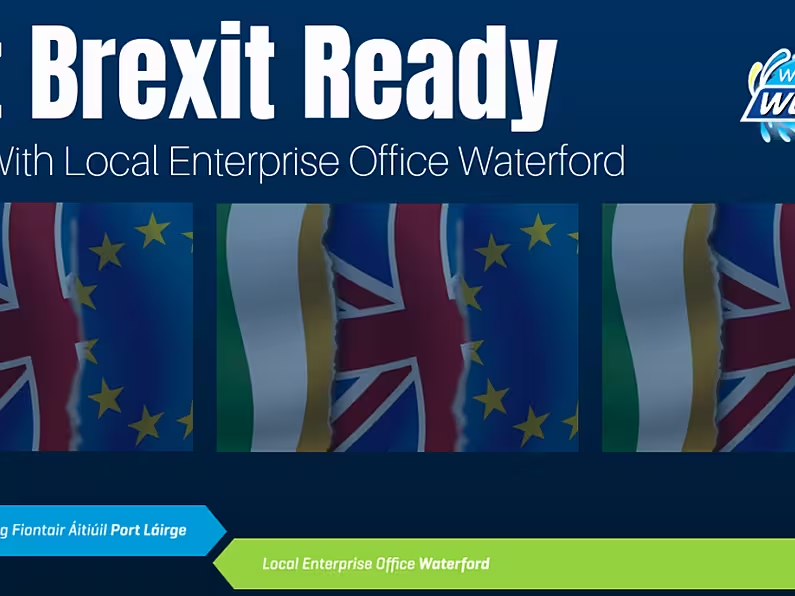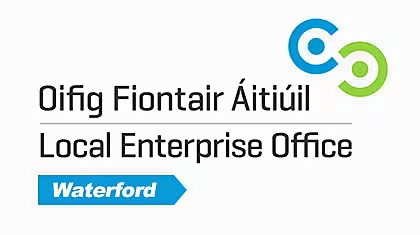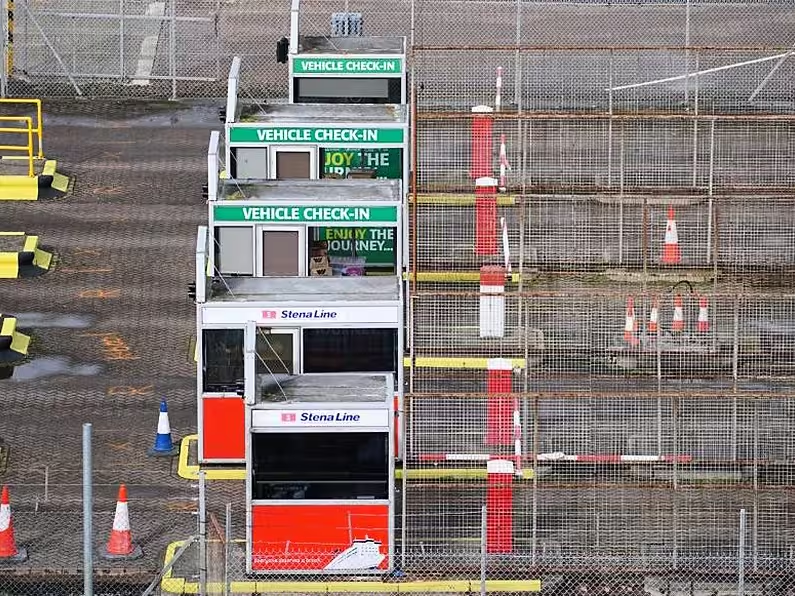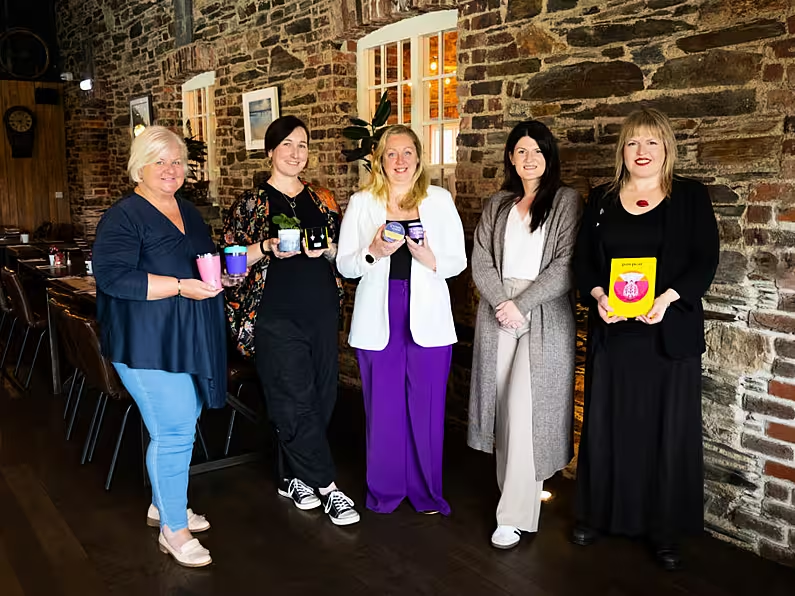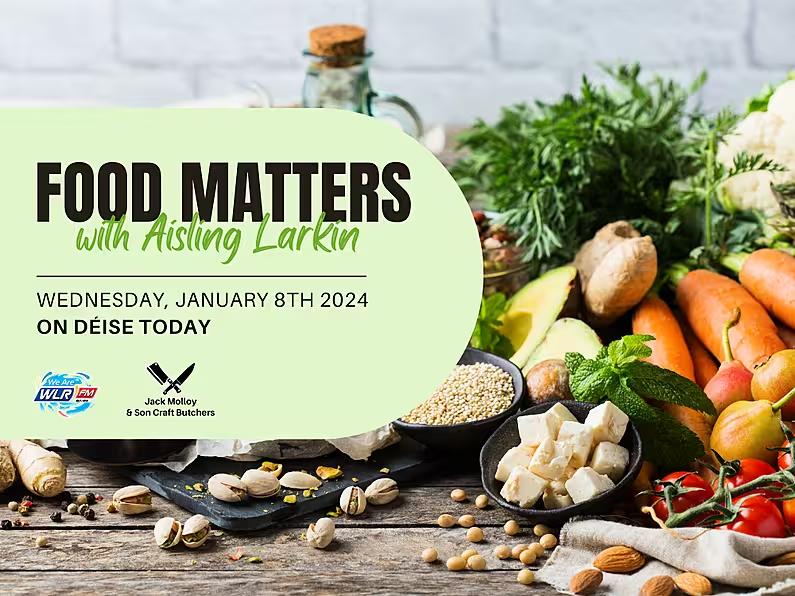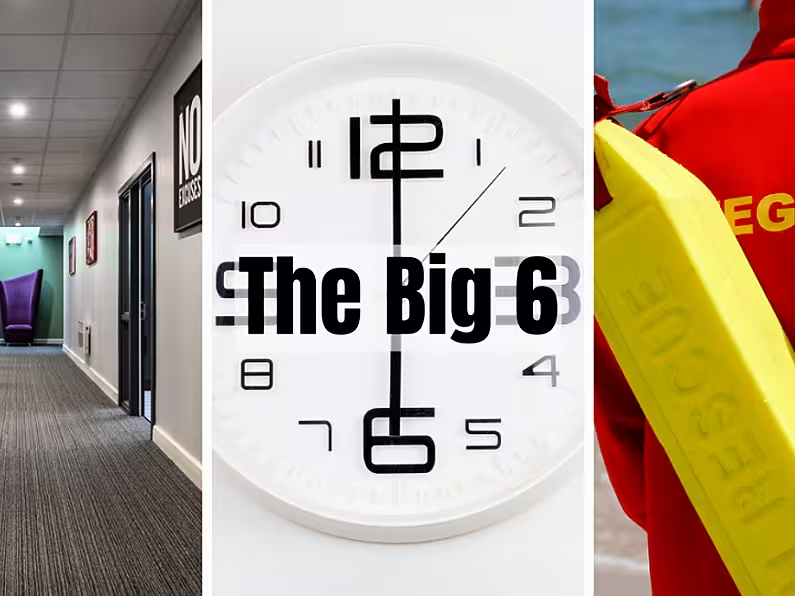Local Enterprise Office Waterford, Helping Waterford Businesses Get Brexit Ready
In preparation for Brexit, it's important that your business is up to date on all aspects of the potential changes to come. We've teamed up with Local Enterprise Office Waterford to help get your business Brexit ready.
As part of our 4 part series, we speak to various experts in their field on how they're preparing and we also hear advice on how to make sure you're preparing correctly.
The 4 part series will cover Customs, Supply Chain Management, Certification of Products/Goods and Currency Management.
#BrexitReady #MakingItHappen
Customs
From October 31st how we trade with the UK will change profoundly. Importing and exporting procedures, customs compliance, goods classification, goods transit and tariffs will, in the event of a no-deal Brexit be subject to the rules of trade with a “Third Country.”
Once the UK leaves the Customs Union, it will be regarded as a non-European Union country, so therefore Waterford companies need to prepare for dealing with a post-Brexit UK.
Local Enterprise Office Waterford will host a free #BrexitReady Customs Export & Import Procedures workshop on Friday, September 13th, that will focus on the potential impacts, formalities and procedures Waterford businesses will need to adopt when trading with a “Third Country.”
Regardless of a hard or soft Customs Brexit, goods to and from the UK or transiting through the UK, will be subject to strict compliance and documentation requirements. Waterford businesses that move goods into and out of the UK will have a customs requirement and will need to understand the new customs paperwork, how to classify their goods and understand what their potential duty cost will be.
Customs declarations will be required to move goods from Ireland to the UK and vice versa. In order to operate within a customs regime, it is necessary to obtain an Economic Operators Registration and Identification (EORI) customs number.
An EORI number is a registration and identification number that EU based businesses will need in order to import or export of goods in or out of the EU, and in the case of a no-deal Brexit, will apply to trade with the UK. Irish companies that trade goods with the UK should obtain an EORI through Revenue’s Online Service (ROS).
Customs Duty will apply to the import and export of goods to and from the UK. Customs Duty, unlike VAT is not recoverable and will present an additional cost of import. Therefore, it is imperative that the correct classification codes are applied to goods to and from the UK. Intertrade Ireland provides a comprehensive guide to help classify your goods to the appropriate code at www.intertradeireland.com/brexit/
In the event of a no-deal Brexit standard rate VAT (currently 23% for ROI) will apply to the import of many goods from the UK into Ireland and will be payable at the time of import of the goods into Ireland unless reliefs apply.
Business should quantify the potential cash flow impact of a no-deal Brexit and explore options to manage the impact such as setting up a VAT and Duty payment deferment account. Following October 31st, postponed accounting for VAT at the point of entry will become available to all Irish registered importers. You can find out more at www.revenue.ie/
Richie Walsh, Head of Enterprise at Local Enterprise Office Waterford said that the uncertainty surrounding Brexit necessitated this Brexit Ready workshop. “There is a lot of vagueness surrounding the implications of the UK leaving the Customs Union on October 31st. Brexit will have an impact on us all and especially on Waterford companies that trade with the UK. Preparing and laying the groundwork for Brexit should make the challenges the October 31st deadline brings more palatable.”
“Export Edge, which will facilitate the workshop, is a leading company in helping companies navigate the maze of trade and customs procedures, keep abreast of compliance responsibilities and mitigate costly delays and penalties. That why this workshop is a must to help Waterford companies get Brexit Ready.”
To book your place on the Local Enterprise Office Waterford Customs Export & Import Procedures workshop, Friday, September 13th, visit www.localenterprise.ie/Waterford
Attendance is free but early booking is essential.
If you have any queries regarding your business and Brexit, talk to LEO Waterford #BrexitReady advisor, David Walsh, by calling 0761 102 905 or email [email protected]
Thomas Moore, Belview Logistics
Thomas Moore speaks to Aoibhin Fallon about importing and exporting post Brexit.
Deal or no deal, Irish business have to prepare for customs, tariffs, declaration forms and much more for when the UK leave the EU.
Thomas Moore gives expert advice and recommendations for any Irish and Waterford Business in the lead up to the 31st of October deadline.
John Dawson, Bell Transport and Logistics
John Dawson, Managing Director with Bell Transport and Logistics and has been with the company for some 17 years. Bell Transport offers clients logistic solutions incorporating Transportation, Warehousing and Distribution for Ireland, UK, Europe and beyond.
Supply Chain Management
From October 31st how we trade with the UK will change profoundly. Waterford companies that trade with the UK will need to take steps to mitigate the impact of trading with a non-European Union country and once the UK leaves the Customs Union, it will be regarded as a “Third Country.”
Importing and exporting procedures, customs compliance, goods classification, goods transit and tariffs will, in the event of a no-deal Brexit be subject to the rules of trade with a “Third Country.”
If your company trades with the UK or your supply chain is partly dependent on the UK, there are some practical supply chain management steps that should be taken to mitigate the impact of Brexit.
The first step advised is to review operations and to determine what level of dependence there is on goods or services that come through or from the UK. This includes where businesses indirectly source materials, stock and ingredients, or any other types of goods through a distributor or wholesaler.
Businesses are also advised to check with suppliers to determine if their supplies from non-UK companies are transiting through the UK, as there may be delays and cost implications such as supply, customs, tariffs and related impacts. It may be prudent to consider sourcing goods or services in Ireland or other EU countries, if at all possible, as it will mitigate the anticipated disruption to the supply chain in the event of a no deal Brexit.
Richie Walsh, Head of Enterprise at Local Enterprise Office Waterford said that it is imperative Waterford companies prepare for disruption in their supply chains.
“It is undoubtedly a worrying time for businesses that are dependent on the UK for materials, goods and services. The anticipated disruption has been well publicised, and it is in local businesses best interests to be aware of the consequences of Brexit and be prepared to investigate alternative sources, or at the very least seek assurances from UK wholesalers and distributors.”
“Local Enterprise Office Waterford is working closely with third party agencies to help businesses navigate the Supply Chain Management dilemma. We have a panel of mentors and industry experts who are available to meet with Waterford businesses to highlight the potential supply chain challenges and prepare a strategy to address these challenges. While it’s not a topic that many companies will enjoy addressing, it unfortunately, is the reality of a no-deal Brexit.”
If you have any queries regarding your business and Brexit, talk to LEO Waterford #BrexitReady advisor, David Walsh, by calling 0761 102 905 or email [email protected]
Peter Cronin, Ardu.ie
As part of our Brexit information series with Waterford Local Enterprise Office, we spoke to Peter Cronin from Ardu.ie, who asks the question, have people calculated the risk that Brexit may pose to their business, in relation to time and money? He also explains the LEO's Brexit Score Card.
Dermot Walsh, Walsh's Bakehouse
Dermot Walsh and his brother Michael have carried on their family tradition and run Walsh's Bakehouse in Waterford. Here, Dermot spoke to Julie Smith about the effects Brexit will have on supply chain management within his company.
Certification of Goods and Services
From October 31st how we trade with the UK will change profoundly. Waterford companies that trade with the UK will need to take steps to mitigate the impact of trading with a non-European Union country and once the UK leaves the European Union and Customs Union, it will be regarded as a “Third Country.”
However, it will not just be customs and supply chain management that will be impacted by Brexit. Compliancy surrounding certificates and licences will also need to be adapted to remain valid post-Brexit.
Certificates, licences and authorisations are required for trade in the EU for many types of goods such as medical devices and construction products, and for services such as those within the transport sector. If you rely on certificates, licences or authorisations issued by UK bodies, in the event of a no-deal Brexit, these may no longer be valid in the EU post-Brexit. Similarly, when the UK leaves the EU, the UK bodies may no longer have the authority to issue certificates or licences within the EU.
To avoid disruption and delays, businesses are advised to take the necessary steps to ensure they are compliant with EU rules:
- You need to check whether your current certifications, licences or authorisations will be valid post-Brexit. If you are a member of a professional body, they may be able to advise you further.
- In the event of no deal, UK Notified Bodies will lose their status as EU Notified Bodies from the withdrawal date. If you rely on UK Notified Bodies for conformity assessment and/or CE Marking, you will need to arrange to either transfer existing certificates, licences or authorisations to an EU27 Notified Body or to obtain new ones altogether. You can check the EU Commission NANDO website https://ec.europa.eu/growth/tools-databases/nando/ for a list of designated EU Notified Bodies.
If you source products from the UK, post-Brexit, you will no longer be considered a distributor but instead classified as an importer. In certain instances, this carries additional responsibilities. These may include checking whether your manufacturers have carried out the appropriate assessments, documentation and legal obligations.
You should contact your suppliers, service providers, logistics companies, wholesalers or distributors for assurances about their services post-Brexit. You are also advised to contact your professional body who may have additional advice for you.
Louise Grubb, Founder of TriviumVet, which develops patented pharmaceutical products for companion animals, has taken precautions to ensure compliance in certification procedures.
“The life sciences sector is already highly regulated, and a no-deal Brexit will signal the end of the UK’s participation in the European regulatory network. This is guaranteed to bring further challenges and obstacles to all companies in the medical, pharmaceutical and life sciences sectors.”
“For a company such as ours, we have to ensure that not only do our products fully comply with the new regulations, but that we retain the highest international standards certification to trade in new global markets.”
Richie Walsh, Head of Enterprise at Local Enterprise Office Waterford said that the implications of a no deal Brexit will have repercussions for businesses of all scales. “It’s not only customs and supply chains that will be disrupted, certification and licensing are also in the firing line. Local Enterprise Office Waterford would urge any business that trades with or through the UK to make preparations now that will minimise disruption and curtail unexpected costs.”
“Local Enterprise Office Waterford, in collaboration with government agencies, is providing a range of programmes and advisory supports to help Waterford businesses prepare for impact.”
“We would recommend that businesses, if they haven’t done so already, complete a Brexit Preparedness checklist. This will help them identify the issues that need addressing urgently. We have appointed a panel of Brexit-specific mentors, are currently running a series of free Brexit clinics and have deployed a dedicated #BrexitReady advisor to provide information and direction regarding each businesses’ Brexit vulnerability.”
To avail of expert advice, information and practical supports, such as the Brexit Preparedness checklist to help your business manage your Brexit response visit http://bit.ly/BrexitReadyLEO
If you have any queries regarding your business and Brexit, talk directly to LEO Waterford #BrexitReady advisor, David Walsh, by calling 0761 102 905 or email [email protected]
Kristian Hobson, Hawthorn Coaching
Aoibhin Fallon spoke to Kristian Hobson about product certification and CE marks post-Brexit.
Louise Grubb, Trivium Vet
In the third installment of our Getting Brexit Ready series with Waterford Local Enterprise Office, Louise Grubb from TriviumVet spoke to Damien about how her business is preparing for Brexit.
Currency Risk Management
From October 31st how we trade with the UK will change profoundly. Waterford companies that trade with the UK will need to take steps to mitigate the impact of trading with a non-European Union country and once the UK leaves the European Union and Customs Union, it will be regarded as a “Third Country.”
However, it will not just be customs, supply chain management and certification that will be impacted by Brexit. Currency fluctuations are anticipated to have a major impact on how businesses trade with the UK post-Brexit.
Currency volatility has been evident since the 2016 Brexit vote. The value of sterling has depreciated approximately 13% against the euro and weak sterling remains a challenge for businesses, especially those that export to the UK.
In order to mitigate the uncertainty and avert the challenges associated with currency risk, there are several practical guidelines that can be followed if your business exports to the UK:
- Enterprise Ireland has devised a Currency Impact calculator to help understand the effect of movements in the sterling/euro exchange rate on businesses and to quantify the exposure your business is open to. The free online tool is widely available at prepareforbrexit.com and demonstrates what an adverse change in exchange rates will have on business profitability.
- Based on your businesses level of currency risk, a comprehensive and robust risk management policy is advised as this will anticipate the levels of currency risk your business can comfortable tolerate.
- Getting two prices or Dual Invoicing (in euro & sterling) is another way to manage your currency risk. By getting two prices you will be able to see the effect of exchange rate difference and have more information to choose the best payment option.
- Consider getting a forward contract. This is an agreement with your bank to exchange a specified amount of foreign currency at a specified date in the future. This will mitigate the uncertainty around future fluctuations and make forecasting easier.
Richard Hurley is Manager of The Granville Hotel, a Waterford hotel renowned as the birthplace of Thomas Francis Meagher and has been planning for the impact of Brexit for the last two years.
“The impact of currency volatility is something that is particularly felt in the tourism sector. The dip in sterling is certainly affecting British holiday makers travelling to eurozone countries. And those that do visit are spending less, as sterling is not yielding a great return against the euro.”
“However, here at the Granville Hotel and more generally within the hospitality sector, forward planning is intrinsic. Whilst the Irish Hotel Federation is continuing to work with the Government and State bodies to mitigate the potential damage, market diversification remains a key focus for Fáilte Ireland and Tourism Ireland, in addition to providing supports for tourism businesses in relation to digital capability, sales skills and operation efficiency.
“A full restoration of the VAT from 13.5% to 9% is necessary to maintain competitiveness and to bring Irish tourism back in line with our European competitors, as is working together as a destination. Caring for the visitors ought to create demand across both the domestic and international market.”
“An example of this has been the collaboration in the food tourism sector resulted in Waterford been awarded the Foodie Destination of Ireland. We are so fortunate that Waterford and the southeast as a region has so much opportunity.”
Richie Walsh, Head of Enterprise at Local Enterprise Office Waterford said that currency risk management is imperative for businesses that export to and trade with the UK.
“The current level of currency volatility is influencing businesses of all scales. Recognising your risk level and putting in place a financial risk management plan is key to weathering the Brexit storm. If companies have the infrastructure in place to respond more effectively to the challenges of currency instability, it will certainly stand to them in the long run.”
“Local Enterprise Office Waterford is working closely with Enterprise Ireland and Government agencies to provide a range of programmes and support to help Waterford businesses get Brexit Ready.”
“We would urge any business that hasn’t addressed the impact of Brexit on their company to get in touch with us today. We have appointed a panel of Brexit-specific mentors, are running a series of free Brexit clinics that cover all aspects of customs, supply chain management, certification and currency risk management. Local Enterprise Office Waterford also has a dedicated #BrexitReady advisor to provide information and direction regarding each businesses’ Brexit vulnerability.”
If you have any queries regarding your business and Brexit, talk directly to LEO Waterford #BrexitReady advisor, David Walsh, by calling 0761 102 905 or email [email protected]
Joe Kelly, Enterprise Consultancy
In the 4th and final installment of our Getting Brexit Ready series with Waterford Local Enterprise Office, we hear from enterprise consultant Joe Kelly who discusses currency, working capital and supply chain in relation to Brexit.
Richard Hurley, The Granville Hotel
General Manager of The Granville Hotel in Waterford city, Richard Hurley, sat down with Damien Tiernan to discuss the lengths they're going to, to prepare for Brexit.



